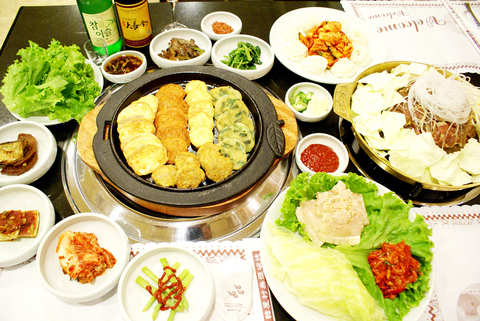Korea House Village (韓屋村)
Address: 3, Ln 105, Shida Rd, Taipei
(台北市師大路105巷3號)

PHOTO: NOAH BUCHAN, TAIPEI TIMES
Telephone: (02) 2364-1980
Open: Daily from noon to midnight
Average meal: NT$1,000 for two, plus 10 percent service charge
Details: Chinese and Korean menu (English menu coming soon)
Proprietors of Korean restaurants in Taiwan often say the food they serve has been changed to suit local palettes, whatever that means. It sounds like some feeble excuse not to put the proper amount of effort into making the pastes and sauces, for which any Korean will tell you is as important as the meat or seafood it's served with, or slicing the meat used for barbecue so thin that it could only grace a hot pot.
Not so with the recently opened Korea House Village. Proprietor Zhao Yi-xian (趙懿憲) is unwilling to compromise authenticity to suite local tastes. Instead, he transplants 10 years of experience operating a restaurant in South Korea, where his mother-in-law grew the peppers and soy beans that go into making the pastes and sauces, to Shida. Three years in the planning, the tableware, the tables and chairs, even the cutlery is imported from South Korea. The walls are lined with tastefully finished traditional Korean art and glass display cases containing expensive ginseng alcohol.
Authentic Korean restaurants are worth a visit if only to sample the free appetizer dishes they serve before the meal. Korea House Village serves up six, and on the day we were there included asparagus, kimchi, pickled eggplant, mackerel and white radish marinated in light soy sauce, tofu in a light soy and ginger sauce topped with green onions and green vegetables marinated in sesame oil. Zhao says that aside from kimchi, the dishes change with the season.
Other specialties on the menu include tempura (NT$250) — a selection of white fish, squash, green onion mini pancakes and kimchi mini-pancakes — that is served with red-pepper paste infused with fresh garlic, hints of ginger and green onions. The exterior of each was crispy with the pancakes chewy on the inside and the fish light in flavor. The octopus and fresh cucumber salad marinated in hot sauce and surrounded by eight noodle nests (NT$300) was zingy.
A good deal for two is the bulgogi (NT$500), or marinated barbecue beef. Served with tofu, noodles, vegetables and seafood on a large iron plate, the mixture is then pan-barbecued and eaten straight up or with fresh lettuce leaves. The menu also offers an extensive selection of grilled barbecue dishes.

The primaries for this year’s nine-in-one local elections in November began early in this election cycle, starting last autumn. The local press has been full of tales of intrigue, betrayal, infighting and drama going back to the summer of 2024. This is not widely covered in the English-language press, and the nine-in-one elections are not well understood. The nine-in-one elections refer to the nine levels of local governments that go to the ballot, from the neighborhood and village borough chief level on up to the city mayor and county commissioner level. The main focus is on the 22 special municipality

The People’s Republic of China (PRC) invaded Vietnam in 1979, following a year of increasingly tense relations between the two states. Beijing viewed Vietnam’s close relations with Soviet Russia as a threat. One of the pretexts it used was the alleged mistreatment of the ethnic Chinese in Vietnam. Tension between the ethnic Chinese and governments in Vietnam had been ongoing for decades. The French used to play off the Vietnamese against the Chinese as a divide-and-rule strategy. The Saigon government in 1956 compelled all Vietnam-born Chinese to adopt Vietnamese citizenship. It also banned them from 11 trades they had previously

Hsu Pu-liao (許不了) never lived to see the premiere of his most successful film, The Clown and the Swan (小丑與天鵝, 1985). The movie, which starred Hsu, the “Taiwanese Charlie Chaplin,” outgrossed Jackie Chan’s Heart of Dragon (龍的心), earning NT$9.2 million at the local box office. Forty years after its premiere, the film has become the Taiwan Film and Audiovisual Institute’s (TFAI) 100th restoration. “It is the only one of Hsu’s films whose original negative survived,” says director Kevin Chu (朱延平), one of Taiwan’s most commercially successful

Jan. 12 to Jan. 18 At the start of an Indigenous heritage tour of Beitou District (北投) in Taipei, I was handed a sheet of paper titled Ritual Song for the Various Peoples of Tamsui (淡水各社祭祀歌). The lyrics were in Chinese with no literal meaning, accompanied by romanized pronunciation that sounded closer to Hoklo (commonly known as Taiwanese) than any Indigenous language. The translation explained that the song offered food and drink to one’s ancestors and wished for a bountiful harvest and deer hunting season. The program moved through sites related to the Ketagalan, a collective term for the